Latin American Studies Collections
Cuba: Grito de Yara (10 October 1868)
Each year, on 10th October, the Cubans all over the world commemorate the call for national independence. The “Grito de Yara,” is one of many important events in the complex historical trajectory of Cuba that unleashed the potential of the national consciousness through rebellions against the Spanish imperial authorities. The full text of the “Manifiesto de la Junta Revolucionaria de la Isla de Cuba” can be read by clicking on the link here.
At UC Berkeley Library, despite our West Coast location and our Pacific Rim orientation, we have a large collection of books that will enlighten our readers about what does “Grito de Yara” means. The other essential Open Access source is dLOC (Digital Library of the Caribbean) where one can browse documents related to the “Grito de Yara.“
Below are some titles that might of interest to the readers of this blog. Since we believe in the equitable access, I am providing some links to the full-text of these items.
Below is a clip from a film,
Professor Rebecca Herman’s New Book Published: Cooperating with the Colossus A Social and Political History of US Military Bases in World War II Latin America Cooperating with the Colossus A Social and Political History of US Military Bases in World War II Latin America

Author:Rebecca Herman, the image is being used for academic, educational, noncommercial purposes only.
UC Berkeley’s Professor Rebecca Herman‘s (History) new book –Cooperating with the Colossus A Social and Political History of US Military Bases in World War II Latin America on our entanglement in Latin America since the World War II is one book that I feel honored to post about in this blog.
According to the Oxford University Press, the book has several interesting facets that are quoted from its website as follows,
- Offers a new perspective on the period of World War II and its importance in the longer history of US-Latin American relations
- Brings together the local, national, and international arenas in which the history of wartime basing unfolded
- Integrates the international history of US-Latin American relations together with local histories of labor, race, gender, and law
- Moves between the realm of high politics and the ground-level social and cultural histories of the communities surrounding US bases.
I am also pleased to post a video of her presentation at the CLAS-Berkeley.
We have access to its electronic avatar through our catalog. Thank you, Professor Rebecca Herman, for always motivating me to do my best to collect difficult to find materials from Latin America!
September 22: National Hispanic Heritage Month Celebration at UC Berkeley Library
Celebrate National Hispanic Heritage Month at the University of California-Berkeley’s Library!
The event will take place on Thursday, September 22 from 12 noon to 1:15 PDT/ 3 pm to 4:14 pm EDT.
The event is open and free to all with prior registration. Please first sign into your personal or institutional zoom accounts and then register.
http://ucberk.li/3sb
Speakers (in alphabetical order)
José Adrián Barragán-Álvarez
Curator, Latin Americana
The Bancroft Library, UC Berkeley
Lillian Castillo-Speed
Head Librarian at Ethnic Studies Library, UC Berkeley
José Montelongo
Maury A. Bromsen Curator of Latin American Books
John Carter Brown Library, Rhode Island
Moderator: Liladhar R. Pendse, Librarian for the Caribbean and Latin American Studies
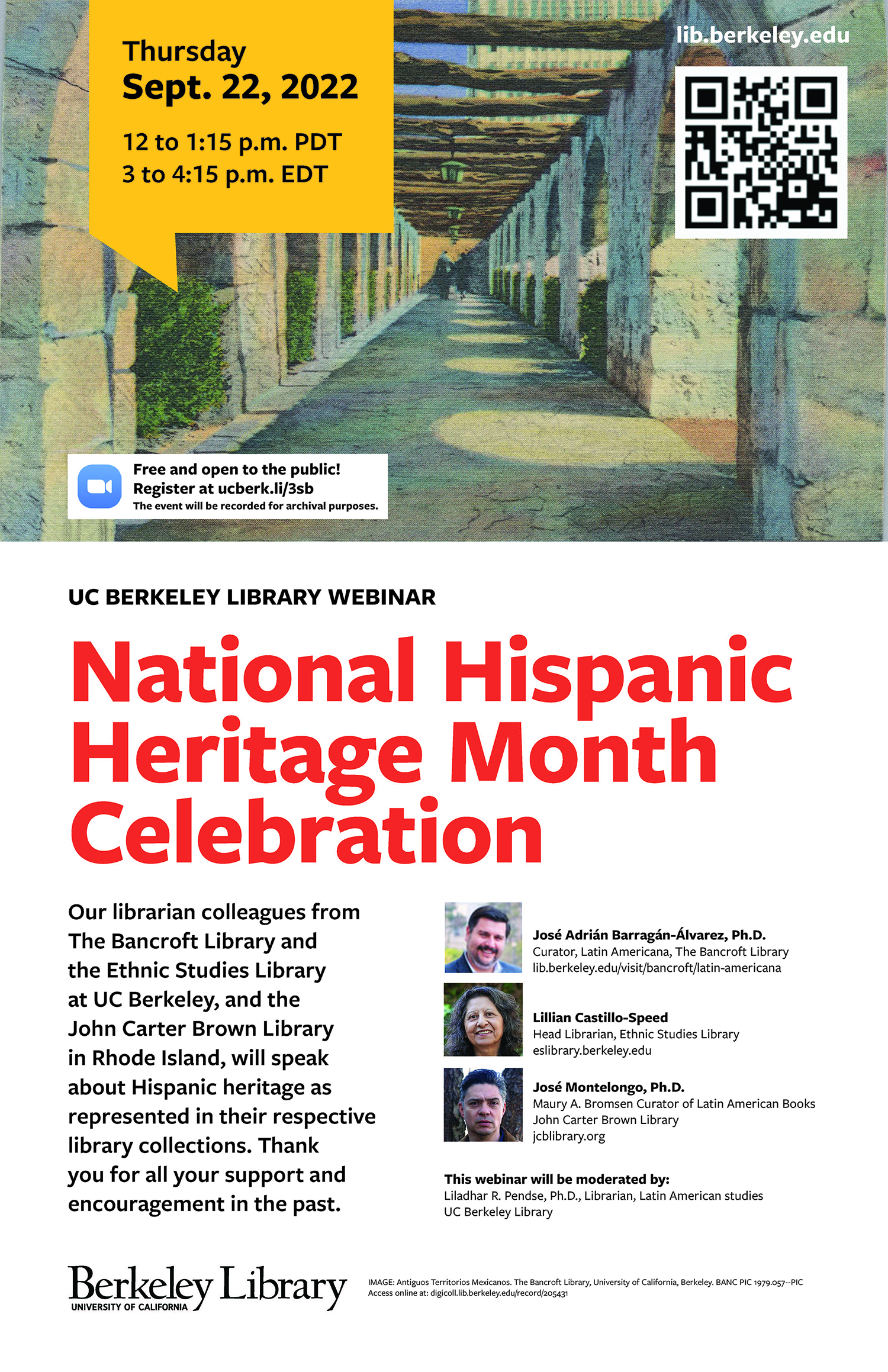
Grito de Dolores, Aniversario de la Independencia and Fiestas Patrias
Each year, Mexico marks an anniversary of its independence. One of the revered heroes of Mexico has been Fr. Miguel Hidalgo y Costilla, whose Grito de Dolores has been frequently used as a rallying tool against the perceptions of injustice. UC Berkeley’s Library is rich in print and analog materials on Mexico’s history. Fiestas Patrias is one essential component of the holiday celebration, both here in the United States and Mexico.
Recently, I was surprised to see a box waiting to for me in the office that was mailed to me by the FCE in Mexico as a gift to the library. Below are some scanned images of the books that were in that box. Not all the books below deal with the Independence of Mexico, however these represent cultural and informational objects that inform their readers of Mexico’s rich yet complicated history and literature.
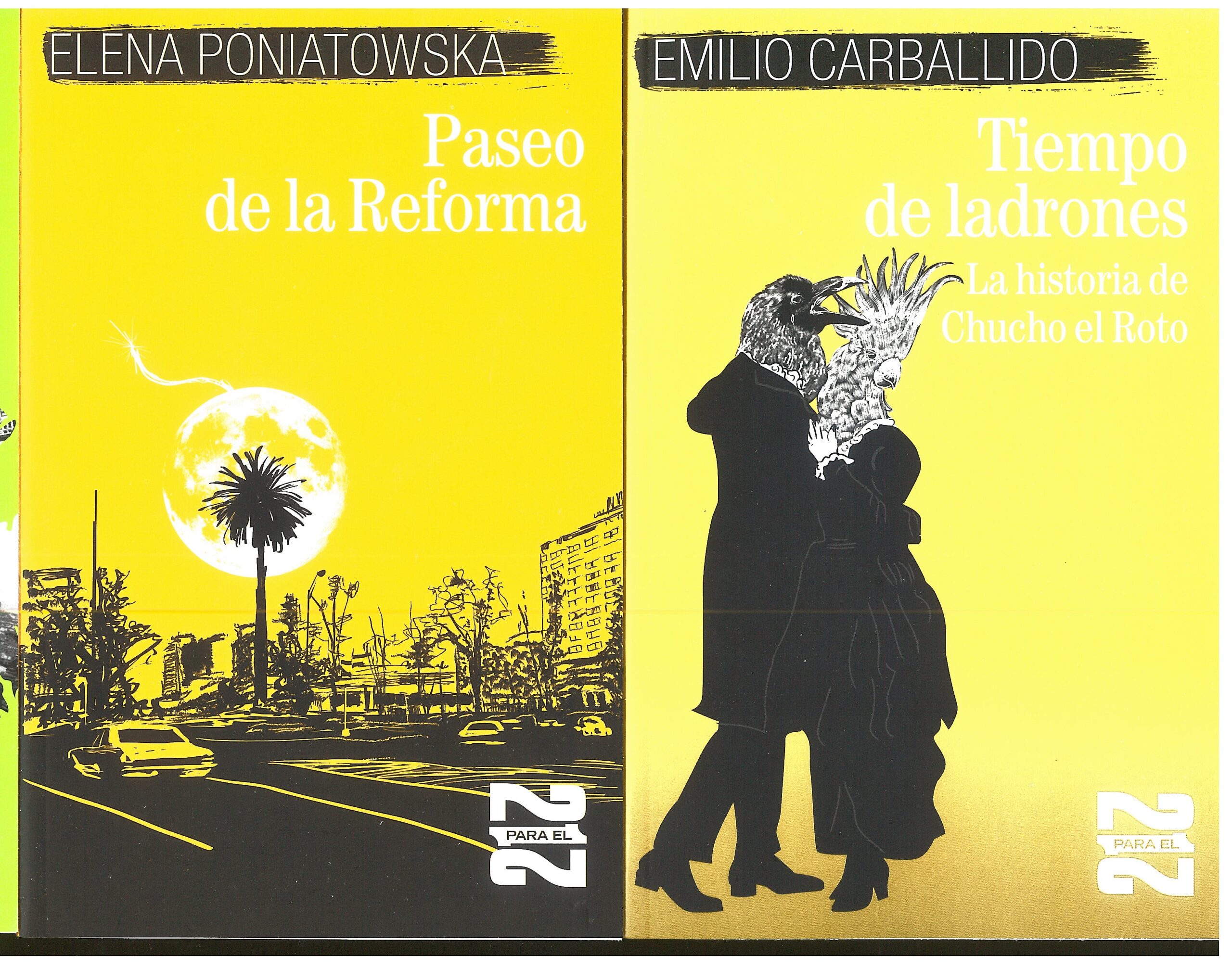
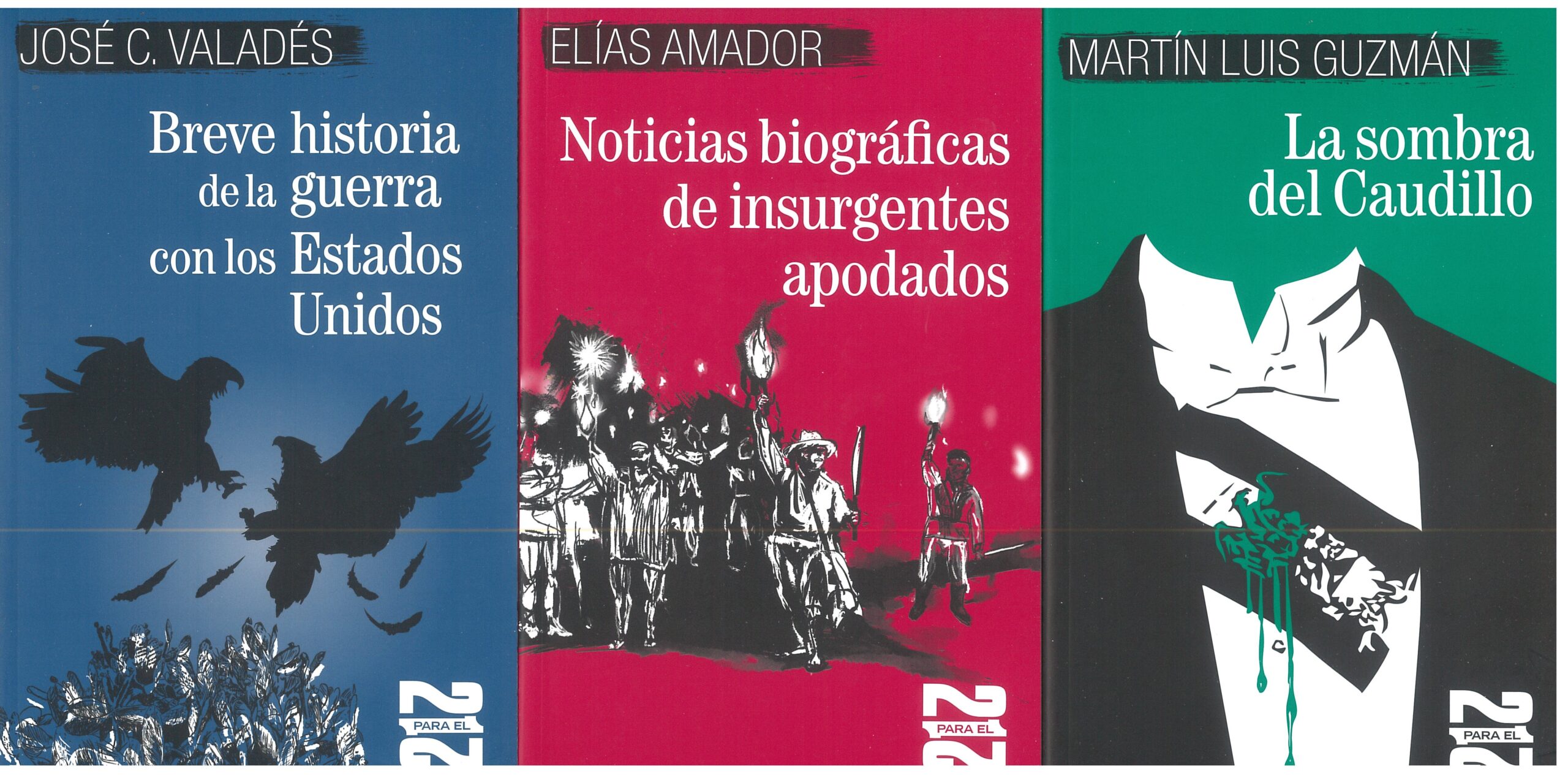
I leave you with a recent video of one of Mexico’s prolific writers and historian, Paco Ignacio Taibo II. We do have many books that deal with the subject of El Cura Hidalgo.
Besides this video, the resilience of el pueblo to survive through odds is something that inspires me to serve our students and faculty from diverse backgrounds as a librarian at a public academic library of University of California.
Economic Survey of Latin America and the Caribbean 2022: Trends and challenges of investing for a sustainable and inclusive recovery
The United Nation’s ECLAC has published a 2022 report on trends and challenges of investing for a sustainable recovery in Latin America and the Caribbean. Below is the self-description, “The 2022 edition of the Economic Survey of Latin America and the Caribbean consists of three parts. Part I outlines the region’s economic performance in 2021, analyses trends in the early months of 2022, and the outlook for growth for the year. It examines the external and domestic factors that have influenced the region’s economic performance in 2021, trends for 2022, and how these factors will affect economic growth in the coming years.
Part II of this edition presents some region’s main challenges in investing for sustainable and inclusive economic growth. It analyses the trends in total investment over the last 70 years and highlights the profound change brought about by the 1980s debt crisis, with a slowdown in investment from the 1990s onwards.
Part III of this publication may be accessed on the Economic Commission for Latin America and the Caribbean (www.eclac.org). It contains the notes relating to the economic performance of Latin America and the Caribbean countries in 2021 and the first half of 2022, together with their respective statistical annexes. The date for updating this publication’s statistical information was 15 July 2022.”
Please click on the image to access this Open Access publication.
New book by faculty: Afro-Atlantic Catholics : America’s First Black Christians–by Professor Jeroen DeWulf
It is my great honor and privilege to introduce readers of this blog to a new book by Professor Jeroen DeWulf titled “Afro-Atlantic Catholics America’s First Black Christians.” The book will be out in early August. The book is long needed to provide a holistic view of the influence of African Catholics on the historical development of Black Christianity in America during the seventeenth century.
The publisher is the University of Notre Dame Press. The description reads, “Black Christianity in America has long been studied as a blend of indigenous African and Protestant elements. Jeroen Dewulf redirects the conversation by focusing on the enduring legacy of seventeenth-century Afro-Atlantic Catholics in the broader history of African American Christianity. With homelands in parts of Africa with historically strong Portuguese influence, such as the Cape Verde Islands, São Tomé, and Kongo, these Africans embraced variants of early modern Portuguese Catholicism that they would take with them to the Americas as part of the forced migration that was the transatlantic slave trade. Their impact on the development of Black religious, social, and political activity in North America would be felt from the southern states as far north as what would become New York.
Dewulf’s analysis focuses on the historical documentation of Afro-Atlantic Catholic rituals, devotions, and social structures. Of particular importance are brotherhood practices, which were critical in disseminating Afro-Atlantic Catholic culture among Black communities, a pre-Tridentine culture and wary of external influences. These fraternal Black mutual-aid and burial society structures were critically important to the development and resilience of Black Christianity in America through periods of changing social conditions. Afro-Atlantic Catholics show how a sizable minority of enslaved Africans actively transformed the American Christian landscape and would lay a distinctly Afro-Catholic foundation for African American religious traditions today. This book will appeal to scholars in the history of Christianity, African American and African diaspora studies, and Iberian studies.”
Professor Dewulf’s groundbreaking research on how one can reflect on early issues surrounding the conceptualization of diversity, faith, race, and belonging in the context of our continent today while not straying away from in-depth historiographical narrative serves as an archive of memory narrative.

New book by Estelle Tarica
Holocaust Consciousness and Cold War Violence in Latin America proposes the existence of a recognizably distinct Holocaust consciousness in Latin America since the 1970s. Community leaders, intellectuals, writers, and political activists facing state repression have seen themselves reflected in Holocaust histories and have used Holocaust terms to describe human rights atrocities in their own countries. In so doing, they have developed a unique, controversial approach to the memory of the Holocaust that is little known outside the region. Estelle Tarica deepens our understanding of Holocaust awareness in a global context by examining diverse Jewish and non-Jewish voices, focusing on Argentina, Mexico, and Guatemala. What happens, she asks, when we find the Holocaust invoked in unexpected places and in relation to other events, such as the Argentine “Dirty War” or the Mayan genocide in Guatemala? The book draws on meticulous research in two areas that have rarely been brought into contact—Holocaust Studies and Latin American Studies—and aims to illuminate the topic for readers who may be new to the fields.
[from publisher’s site]
Estelle Tarica is Professor of Latin American Literature and Culture and former Chair of the Latin American Studies Program at UC Berkeley. She is incoming Chair of the Department of Spanish & Portuguese. Her previous book The Inner Life of Mestizo Nationalism concers the discourse of indigenismo and mestizaje in Mexico, Peru and Bolivia focusing on the work of José María Arguedas, Rosario Castellanos and Jesús Lara. Her articles have appeared in edited volumes and in the journals Chasqui, Revista de Crítica Literaria Latinoamericana, Latin American Literary Review, Journal of Latin American Studies, Política Común and Yale French Studies, among others.
She discussed her latest book with Alejandra Decker (Hispanic Languages and Literatures, UCB) and Robert Kaufman (Comparative Literature, UCB) on April 7 through the Center for Latin American Studies.
Holocaust Consciousness and Cold War Violence in Latin America.
Albany: State University of New York Press, 2022.
Cinco de Mayo (El Día de la Batalla de Puebla) through books
Each year, Cinco de Mayo (El Día de la Batalla de Puebla) is celebrated in the United States and Mexico to commemorate the victory of Mexico over the invading imperial French forces at the Battle of Puebla. While today, many “Western” powers adhere to the democratic principles of governance, in the 19th century, most of them practiced imperialism without much guilt. We all know that the self-ascribed civilizing missions of these Western European and Russian Imperial forces, including our democratic American expeditionary force in the Phillippines and other places, remain well-documented in the books and news media of the time. After all, David did overpower Goliath; such was the case for ill-equipped Mexican forces who triumphed over better-equipped French forces. The battle took place 160 years ago, on May 5, 1862, outside of Puebla. Here are some books that would refresh our memories about the significance of Cinco de Mayo.
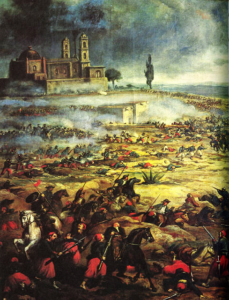
Some subject designations like the one below will help us quickly locate the books from our collections.
European Intervention in Mexico (1861-1867)
Mexico — History — European intervention, 1861-1867
France — Foreign relations — Mexico
Mexico — Foreign relations — France
Mexico — Foreign relations — 1861-1867
France — History — Second Empire, 1852-1870
And below are a few books that might be of interest to our readers.
Cluseret, G. Mexico, and the Solidarity of Nations. New York: Blackwell, 1866. Print.
Chevalier, Michel. L’expédition du Mexique. Paris: E. Dentu, 1862. Print.
And here is a clip that one might watch to understand further the complex nature of European involvement in Mexican affairs.
New UN Archives Geneva Platform
The United Nations Library & Archives Geneva is pleased to announce the new UN Archives Geneva Platform launch. This new online platform makes it easier to navigate and search approximately ten linear kilometers of archives managed by the UN Library & Archives Geneva, including different fonds such as 19th-century peace movements, the League of Nations, UN Geneva, and additional UN entities based in Geneva.
Thanks to the LONTAD project, the platform provides access to over 10 million digitized pages of the League of Nations archives. By 2022, the entirety of the archives of the League of Nations will be available online (including photographs and maps).
The launch of the platform enables researchers to search exceptional primary sources. It also opens new ways of conducting research in the archives. More information is available here.
With the new platform, we are now offering free tailored online presentations and trainings for researchers and students to explain the structure of the UN archives in Geneva, how the platform works, the material available online and the documents which are still not digitized but available for consultation in site. These presentations can be provided for faculty meetings, seminars and courses, or whatever setting is desirable. Catering to your needs, our specialists can present the wealth of archival documents – digitized and physical – available at the UN Library & Archives Geneva, explain how to use the platform, and show the work of the Institutional Memory Section. For further information, do not hesitate to contact us: https://ask.unog.ch/archives
Contact Info:
Pierre-Etienne Bourneuf, UN Library & Archives Geneva
Palais des Nations, 8-14 Avenue de la Paix, 1211 Genève
Source: Email-Guy Burak-Mela-NYU 04/22/2022
Voices from Ukraine: Ukrainian librarians in the struggle against Russian invasion!
We invite you to join us for a Zoom-based event where librarians across Ukraine will speak to us about their daily lives, work, and heroic efforts to preserve their collections and provide services during the war. Russia’s ongoing war against Ukraine is a tragedy of cultural and humanitarian dimensions. The organizing committee members think it is vital to hear from our brave colleagues in Ukraine.
Date: April 6, 2022
Time: 9 am PST/ 10 am MST/ 11 am CST/ 12 noon EST/ 7 pm Kyiv
Duration: 90 minutes
Registration Link: http://ucberk.li/3o9
Organizers: The Coalition of Slavic Librarians for Peace (CSLP): Olha Alkesic (Ukrainian Research Institute at Harvard University), Ksenya Kiebuzinski (University of Toronto), Liladhar R. Pendse (University of California-Berkeley) and George Andrew Spencer (University of Wisconsin-Madison)
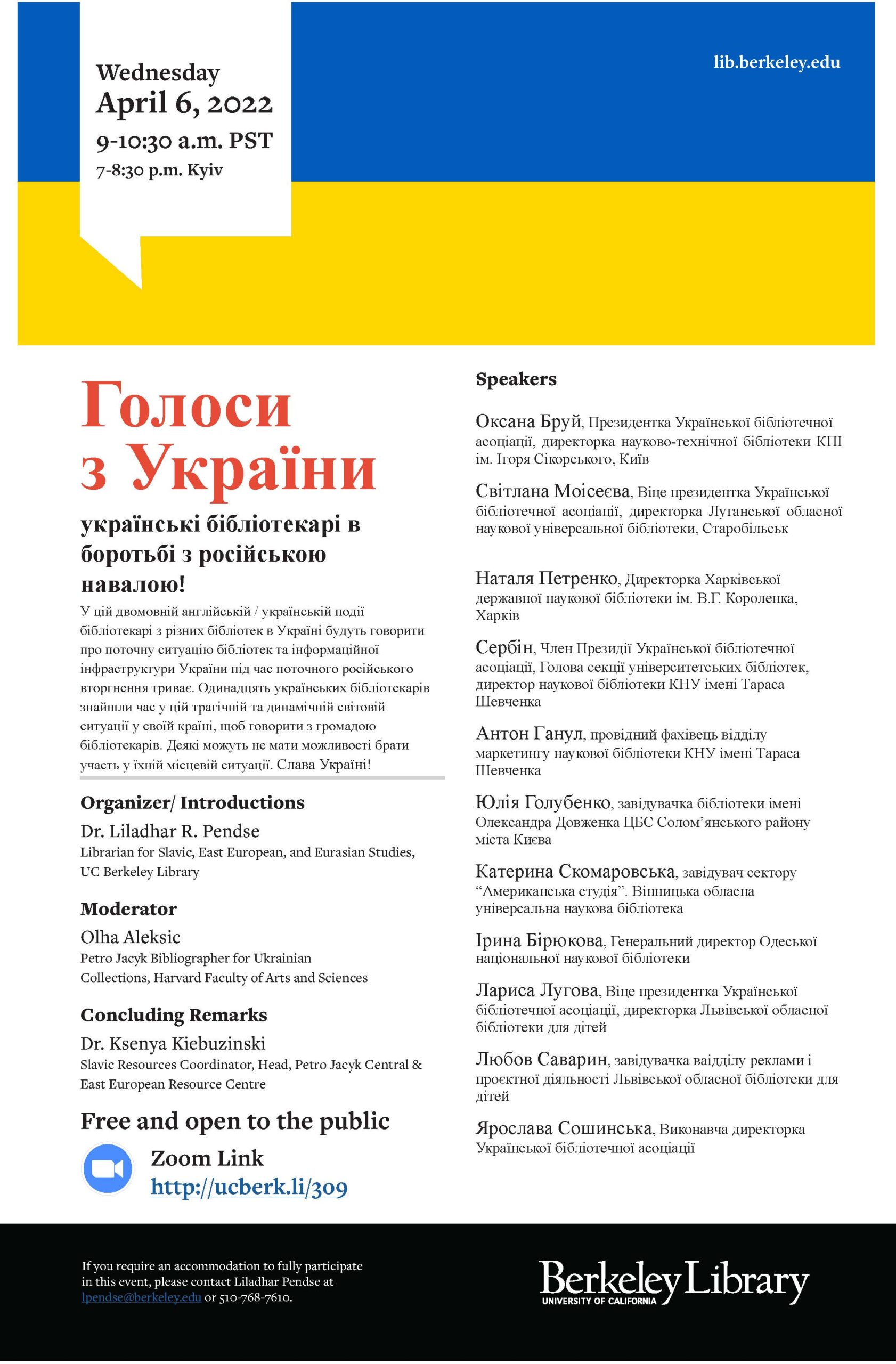
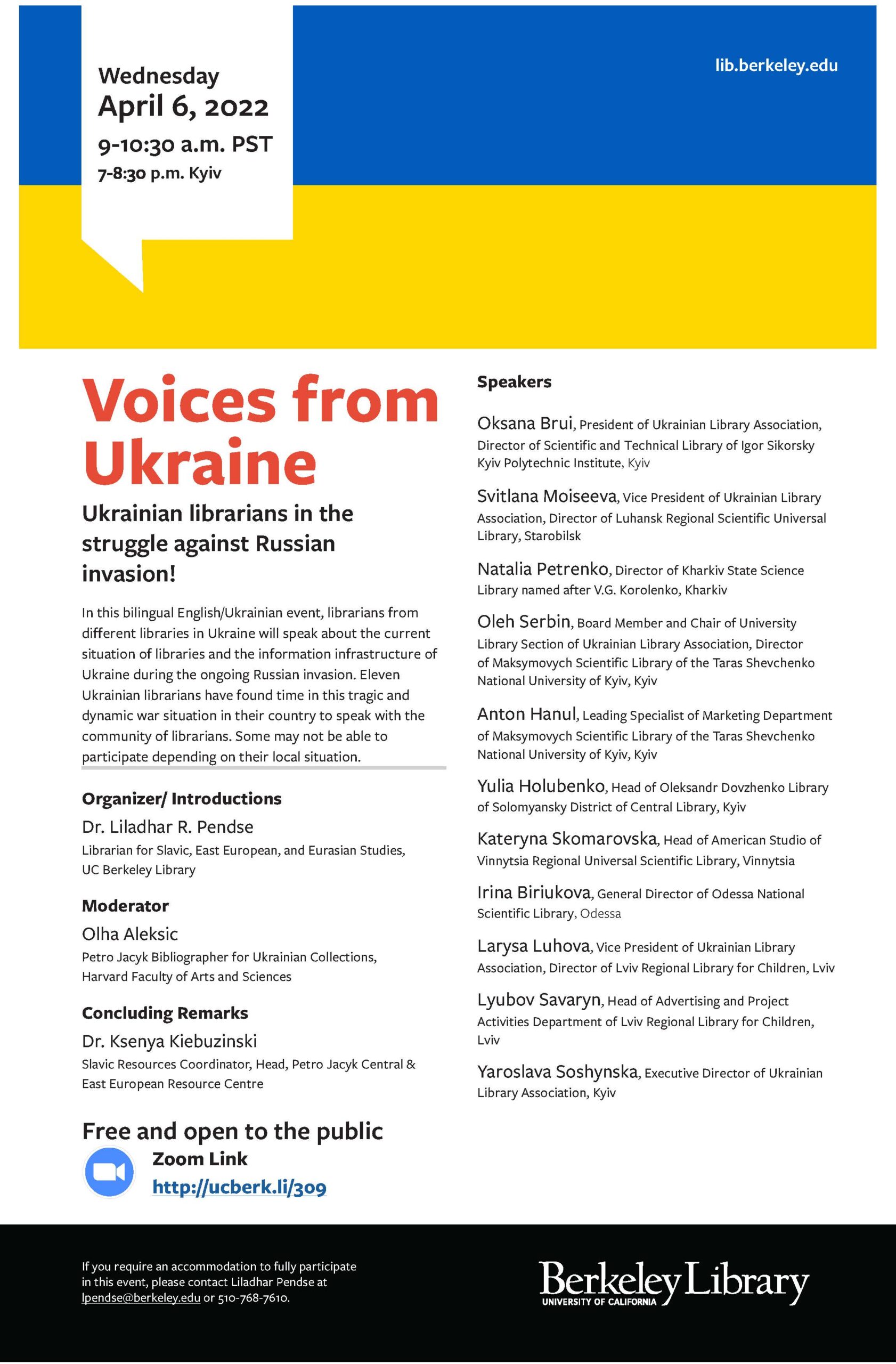
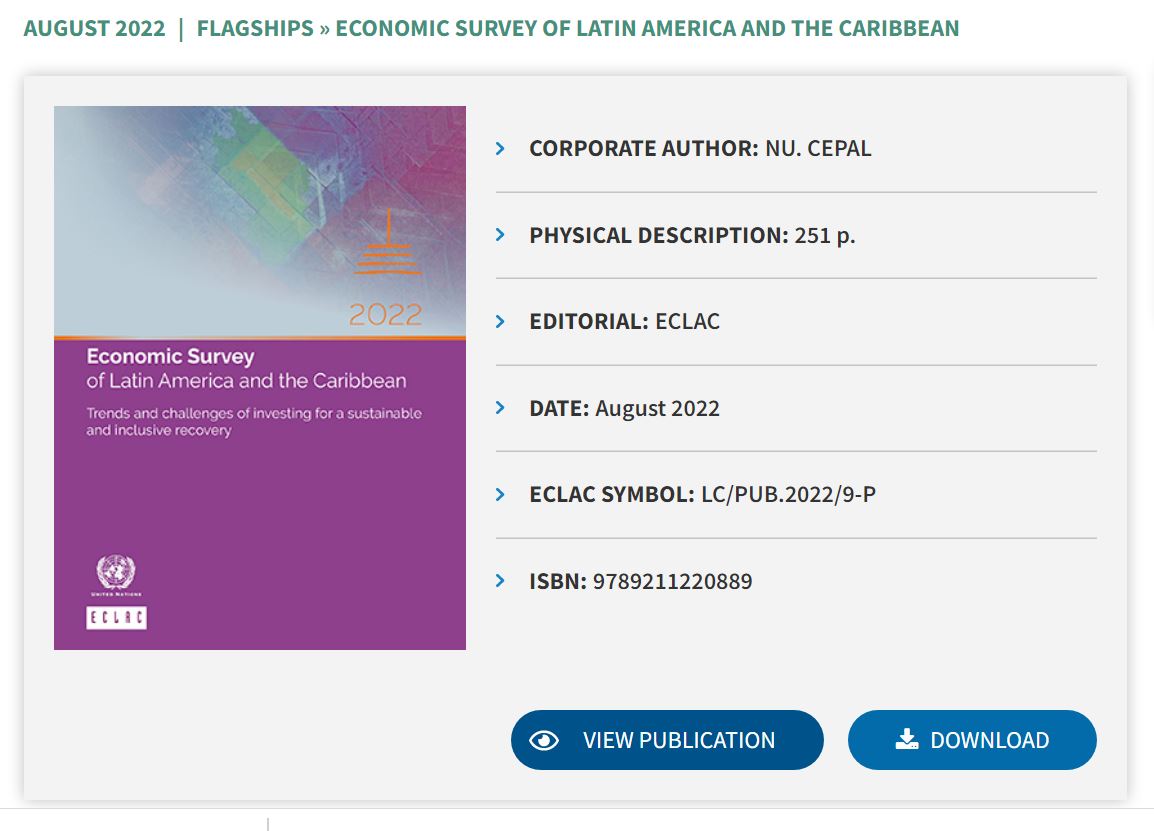
![[book cover]](https://update.lib.berkeley.edu/wp-content/uploads/2022/06/tarica.png)
